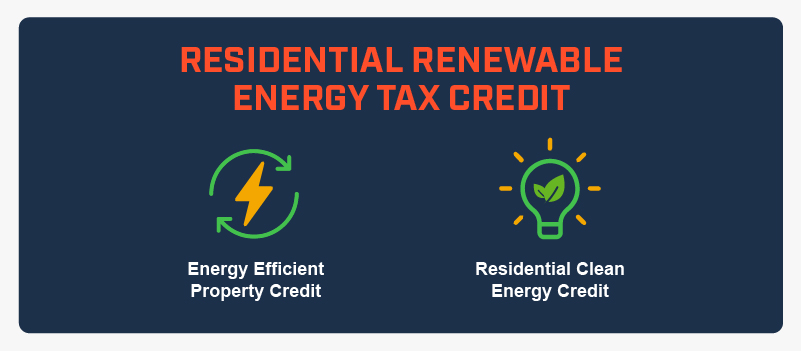
Disclaimer: This guide provides an overview of the federal investment tax credit for residential homeowners. It does not constitute professional tax advice or other professional financial guidance. This guide should also not be used as the only source of information when making purchasing decisions, investment decisions, tax decisions, or other binding agreements.
There are a number of rebates and rewards you can take advantage of for going green with your home’s heating and cooling systems. You can earn this credit by making qualified energy efficient-related improvements to your home—like installing new insulation or a solar heating and cooling system. All residential renewable energy tax credits have certain eligibility and requirements that you have to meet. Here are a few of the most common residential renewable energy tax credits that homeowners seek out.
What is a Renewable Energy Tax Credit?
Renewable energy tax credits are government incentives that reimburse homeowners when they invest in owning and operating renewable energy and energy-efficient home systems such as solar power, and more efficient, ENERGY STAR®, all-electric appliances. These credits are dollar-for-dollar reductions in the amount of federal income tax homeowners owe to the IRS, or are returned as a refund if one is due.
How to Be Eligible for Residential Renewable Energy Tax Credits
You may apply for a tax credit by installing energy-efficient products or systems in your home that come with a Manufacturer’s Certification Statement. This is a signed statement that a manufacturer provides to certify that a product or component qualifies for a tax credit. If the statement doesn’t come with the product, you may find the Certification on the manufacturer’s website. It is important to note that while ENERGY STAR-labeled products may help you save energy, not all of them qualify for tax credits.
The American Recovery and Reinvestment Act divides the credits offered into two categories: renewable energy and home energy efficiency credits.
Renewable Energy and Energy-Efficient Incentives
Over the years, there have been a number of tax incentive laws that have been passed and signed into law. New federal income tax credits are available through 2032 providing up to $3,200 annually to lower the cost of energy efficient home upgrades by up to 30%.
Homeowners can also take advantage of Residential Clean Energy credit, which provides a 30% income tax credit for clean energy equipment through 2032, stepping down to 22 percent for 2033 and 2034.
The Inflation Reduction Act
The Inflation Reduction Act of 2022 (IRA) is the largest climate investment by the Federal Government. Its goal is to reduce greenhouse gas by 31% by 2030. In order to meet this goal, the IRA incentivizes homeowners to install more efficient, all-electric appliances throughout their homes.
Under the Inflation Reduction Act, you can get a tax credit for 30% of the cost of installing clean energy systems in your home, including solar panels, wind turbines, battery power storage, and more.
Credits for Renewable Energy Systems
- Solar photovoltaic (PV) panels: The panels must provide power to the homeowner’s residence; provides a tax credit of 30 percent of the total system cost
- Solar hot water systems: Only solar hot water systems are eligible, not backup water systems; the Solar Rating and Certification Cooperation (SRCC) must certify the system; provides a tax credit of 30 percent of the total system cost
- Small residential wind systems: The credit applies to small wind turbines with a rated capacity of 100 kilowatts or less; provides a tax credit of 30 percent of the total system cost
- Geothermal heat pumps: Must be ENERGY STAR-qualified; provides a tax credit of 30 percent of the total system cost, up to $2,000 per year
Credits for Home Energy Efficiency Improvements
- Conventional HVAC: The tax credit applies to qualifying ENERGY STAR-labeled solar heating and cooling systems, central A/C, air-source heat pumps, advanced main air circulating fan, propane or natural gas furnaces, and hot water boilers powered with gas, oil or propane; provides a tax credit of 30 percent, up to $1,500
- Roofing: The tax credit applies to ENERGY STAR-qualified asphalt and metal roofs; provides a tax credit of 30 percent, up to $1,500
- Insulation: Must meet 2009 International Energy Conservation Code standards and amendments; product must have at least a two-year warranty; provides a tax credit of 30 percent, up to $1,500
- Doors and windows: The tax credit applies to some ENERGY STAR-labeled products; skylights do not qualify; provides a tax credit of 30 percent, up to $1,500
Ensure Your Home is Environmentally Friendly with the Help of AAA Heating & Cooling
To take the guesswork out of systems and improvements that qualify for the residential renewable energy tax credit, AAA Heating & Cooling can provide you the respective information regarding its products and services. To maximize your credit, keep in mind that it applies to the cost of the products, as well as the installation and labor.
To learn more about improving your home’s performance, contact AAA today.
